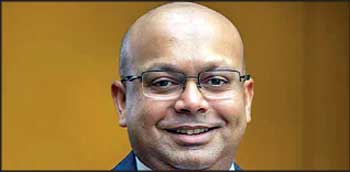Saturday Feb 21, 2026
Saturday Feb 21, 2026
Wednesday, 20 August 2025 12:15 - - {{hitsCtrl.values.hits}}
 |
| Lynear Wealth Managing Director Dr. Naveen Gunawardane |
The largest private investor in the Colombo Stock Exchange Lynear Wealth Management Managing Director Dr. Naveen Gunawardane recently said Sri Lanka’s equity market is entering a period of structural change as Government reforms take hold and macroeconomic conditions stabilise.
“Sri Lanka has recently gone through a couple of structural reforms, which are going to make the macro environment very different from what we’ve seen in the past, certainly since, for example, 2008 or 2009,” he said, sharing his perspectives on why the current economic recovery was different from the past at the Invest Sri Lanka Forum held 12 August in Singapore organised by the Colombo Stock Exchange and Securities and Exchange Commission of Sri Lanka.
The introduction of the Public Finance Management Act and the Government’s commitment to running a primary surplus will underpin this shift.
For decades, the country has run large primary deficits, forcing the Central Bank to finance Government spending. That contributed to cycles of interest rate hikes of 500 to 600 basis points in short periods, even outside crisis conditions. “What’s going to happen in the future is that we will see a lot more stable interest rates, and that has huge implications as a domestic manager in terms of hazard allocation decisions,” Dr. Gunawardane said.
With inflation easing after peaking at nearly 70%, interest rates have fallen to 8%–9%. “For us in Sri Lanka, 8% to 9% is too low, which basically means that your long-term fund managers, your insurance companies, your pension funds, which were nicely enjoying those 13%, 14% fixed income returns, now are looking at potentially after-tax returns of about 5%, 6%. So they will be forced to increase equity allocations,” Dr. Gunawardane noted.
Lynear Wealth expects domestic institutions and wealthy individuals to reallocate toward equities. “We manage a lot of ultra-high net worth money. And we are seeing a lot more of asset allocation changes to equities coming from that side.”
Despite the market rally, he said valuations remain attractive. “We think there’s potentially about 20-25% earnings growth left in the market. This is expected to come from both volume recovery and operational leverage. The construction sector is at about six to seven times forward earnings. The two large banks are still at 0.8, 0.85 forward book. And so I still think that there is a fundamental basis for equity markets as well.”
A further driver is the external balance. After years of current account deficits, Sri Lanka has recorded surpluses since 2020. “The surpluses that we saw in 2023 and 2024 were artificial because we had import controls. But right now, we have a current account surplus, which I think is real because import controls have been removed.”
He said stability in both the exchange rate and interest rates will depend on policymakers maintaining reforms. “Provided that we stick to the reforms that were done, provided that the Government sticks to fiscal discipline, provided that we keep the Central Bank independent, Sri Lanka is going to see a period of relatively stable interest rates, relatively stable exchange rates. We have not seen that in the past.”
Dr. Gunawardane also pointed to opportunities for Sri Lankans overseas. Many expatriates have funds trapped in local banks due to capital controls, often earning about 7% pre-tax. He argued that mutual funds, known as unit trusts in Sri Lanka, provide a better option. “Mutual funds in Sri Lanka are permitted investments for any Sri Lankan expat who has money in the so-called blocked accounts. I don’t think it makes sense for any Sri Lankan expat to keep money in a bank going forward. The banks are not going to like to hear me say that, but I would strongly suggest that they look at the mutual fund industry.”
On the Government’s reform program under the IMF, Dr. Gunawardane expressed cautious optimism. “I myself had some concerns about whether the Government will stick to the program. I have to say that I’ve been proved wrong. There appears to be commitment from the Government to stick to the program. However, the challenge is not going to be now. We don’t really have much of a choice.”
The bigger risk, he said, will come later when buffers are rebuilt. “When we have enough buffers that is when the temptation comes in to loosen a little bit. And I sincerely hope that the Government will still continue to stick to the program. Because if we can stick to the current trajectory beyond the IMF program. stick to fiscal discipline, stick to the Central Bank Act, stick to inflation target management, then if you can do that for five years, you’ll be looking at a very different country.”